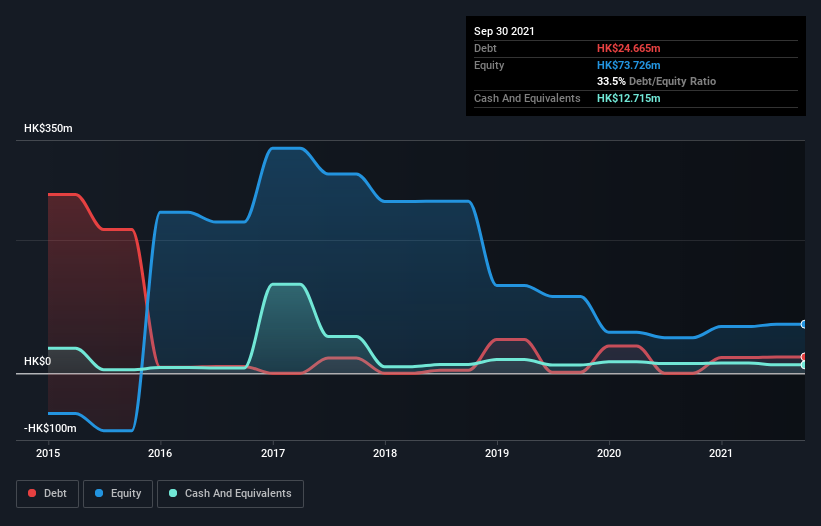
David Iben put it well when he said, 'Volatility is not a risk we care about. What we care about is avoiding the permanent loss of capital.' So it seems the smart money knows that debt - which is usually involved in bankruptcies - is a very important factor, when you assess how risky a company is. We can see that Elife Holdings Limited (HKG:223) does use debt in its business. But the real question is whether this debt is making the company risky.
When Is Debt Dangerous?
Generally speaking, debt only becomes a real problem when a company can't easily pay it off, either by raising capital or with its own cash flow. Part and parcel of capitalism is the process of 'creative destruction' where failed businesses are mercilessly liquidated by their bankers. However, a more frequent (but still costly) occurrence is where a company must issue shares at bargain-basement prices, permanently diluting shareholders, just to shore up its balance sheet. By replacing dilution, though, debt can be an extremely good tool for businesses that need capital to invest in growth at high rates of return. When we think about a company's use of debt, we first look at cash and debt together.
Check out our latest analysis for Elife Holdings
How Much Debt Does Elife Holdings Carry?
As you can see below, at the end of September 2021, Elife Holdings had HK$24.7m of debt, up from none a year ago. Click the image for more detail. However, because it has a cash reserve of HK$12.7m, its net debt is less, at about HK$12.0m.

A Look At Elife Holdings' Liabilities
We can see from the most recent balance sheet that Elife Holdings had liabilities of HK$56.8m falling due within a year, and liabilities of HK$18.2m due beyond that. On the other hand, it had cash of HK$12.7m and HK$88.0m worth of receivables due within a year. So it actually has HK$25.7m more liquid assets than total liabilities.
This short term liquidity is a sign that Elife Holdings could probably pay off its debt with ease, as its balance sheet is far from stretched. The balance sheet is clearly the area to focus on when you are analysing debt. But you can't view debt in total isolation; since Elife Holdings will need earnings to service that debt. So when considering debt, it's definitely worth looking at the earnings trend. Click here for an interactive snapshot.
Over 12 months, Elife Holdings reported revenue of HK$259m, which is a gain of 83%, although it did not report any earnings before interest and tax. Shareholders probably have their fingers crossed that it can grow its way to profits.
Caveat Emptor
Despite the top line growth, Elife Holdings still had an earnings before interest and tax (EBIT) loss over the last year. Its EBIT loss was a whopping HK$28m. Looking on the brighter side, the business has adequate liquid assets, which give it time to grow and develop before its debt becomes a near-term issue. Still, we'd be more encouraged to study the business in depth if it already had some free cash flow. This one is a bit too risky for our liking. There's no doubt that we learn most about debt from the balance sheet. But ultimately, every company can contain risks that exist outside of the balance sheet. To that end, you should learn about the 4 warning signs we've spotted with Elife Holdings (including 1 which is potentially serious) .
When all is said and done, sometimes its easier to focus on companies that don't even need debt. Readers can access a list of growth stocks with zero net debt 100% free, right now.
Valuation is complex, but we're here to simplify it.
Discover if Elife Holdings might be undervalued or overvalued with our detailed analysis, featuring fair value estimates, potential risks, dividends, insider trades, and its financial condition.
Access Free AnalysisHave feedback on this article? Concerned about the content? Get in touch with us directly. Alternatively, email editorial-team (at) simplywallst.com.
This article by Simply Wall St is general in nature. We provide commentary based on historical data and analyst forecasts only using an unbiased methodology and our articles are not intended to be financial advice. It does not constitute a recommendation to buy or sell any stock, and does not take account of your objectives, or your financial situation. We aim to bring you long-term focused analysis driven by fundamental data. Note that our analysis may not factor in the latest price-sensitive company announcements or qualitative material. Simply Wall St has no position in any stocks mentioned.
About SEHK:223
Elife Holdings
An investment holding company, engages in the supply chain business for branded goods and consumer products in Hong Kong and the People’s Republic of China.
Adequate balance sheet slight.
Market Insights
Community Narratives



